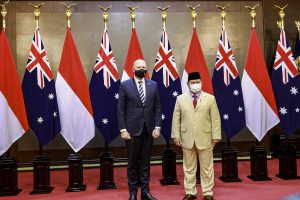Indonesia and Australia have taken an important step toward the deepening of their bilateral security relations, signing new agreements on counterterrorism, defense, and cybersecurity.
The agreements were signed yesterday in Jakarta during a meeting between Australian Foreign Minister Marise Payne and Defense Minister Peter Dutton and their Indonesian counterparts Retno Marsudi and Prabowo Subianto. Payne and Dutton were in Indonesia on the first stop of an overseas tour that will also take them to India, South Korea, and the United States.
Among the agreements were a revised and upgraded version of the Australia-Indonesia Defense Cooperation Arrangement signed in February 2018, shortly before the two nations elevated their ties to a “comprehensive strategic partnership.” The two nations also updated two memorandums of understanding on counterterrorism and cybersecurity.
Indonesian Defense Minister Prabowo Subianto told a press conference that the new agreement could pave the way for the country’s two armed forces engage in joint military training in Australia, and for Indonesian cadets to attend Australian academies such as the Royal Military College at Duntroon. He described both as “a historical first.”
“I think this is important to enhance our cooperation,” Prabowo said. “Indonesia and Australia are important friends and partners in this region, we are close neighbors and we would like to be even closer friends.”
The ministerial meetings included discussion of efforts to overcome the pandemic, the risks posed by the Taliban’s takeover of Afghanistan, and broader security issues in a region that has been thrown out of strategic equilibrium by China’s rapid growth.
In his own comments, Dutton described Indonesia and Australia as “anchors of cooperation” in an “increasingly contested” Asian region. “Our renewed defense cooperation arrangement will see Australia and Indonesia step up our training initiatives, our joint training initiatives, and defense operational activities over the coming years,” he said.
The agreements mark the latest in a stepwise improvement in relations between Canberra and Jakarta, which have a long history of military engagement. But relations have been strained over the years, including by allegations about abuses by Australian-trained Kopassus special forces in Timor-Leste in 1999, the Australian phone-tapping of high-level officials in 2013, and Indonesian concerns about remarks made at an Australian Army language training facility in 2017. The result has been what has been termed a “sawtooth trajectory,” in which relations have moved between discord and concord.
As Dutton’s comments suggest, however, that zigzagging pattern may conceal a broader upward trajectory in relations. In recent years, Indonesia and Australia have been pressed together by shared concerns about the turbulence in maritime regions of Asia that have been roiled by China’s growing military power and strategic ambition, and the reaction that this has elicited from other powers, particularly the United States.
At the same time, this broad strategic convergence conceals areas of difference. As suggested by Dutton and Payne’s upcoming itinerary, Australia views sound security relations with Indonesia as a complement to its engagement with the Quadrilateral Security Dialogue, or Quad, which also includes Japan, the U.S., and India. Indeed, the duo’s overseas tour came as Prime Minister Scott Morrison confirmed he expected to attend the first face-to-face meeting of the “Quad” alliance, which will be held in Washington sometime in the next few weeks, reportedly on September 24.
Indonesia, meanwhile, will continue to hew to its long-established “independent and active” foreign policy, which prioritizes omnidirectional engagement with numerous outside powers, alongside a closer focus on ASEAN and its position of centrality at the heart of the region’s diplomacy.
While a degree of mismatch will no doubt remain, it is increasingly the case that the Australia and Canberra find themselves sharing “like-minded” views about the changing balance of power in Asia.

































